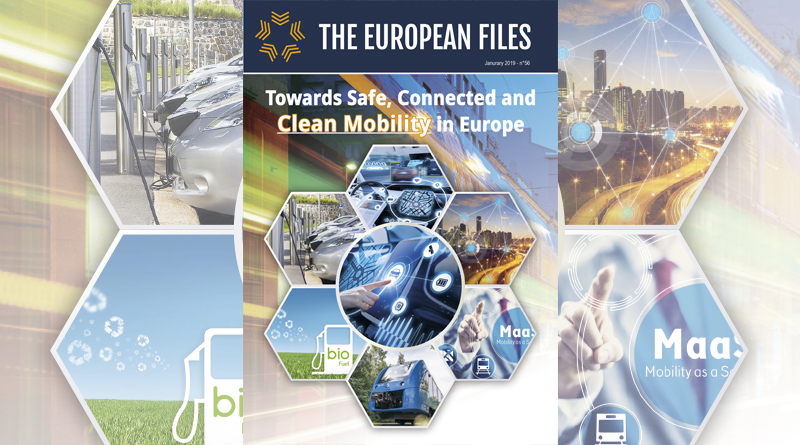
Towards Safe, Connected and Clean Mobility in Europe
Towards Safe, Connected and Clean Mobility in Europe
Nowadays, transport accounts for more than a fifth of CO2 emissions and 33% of energy consumption in Europe; as such, it is the main source of air and noise pollution in our cities. A particular focus has to be made on road transport sector, which contributes up to 75% to the overall EU transport pollution.
The International Energy Agency (IEA) predicts that greenhouse gas emissions from transport will increase by 120% between 2000 and 2050.
The automotive sector is a driving force of the European economy, which will have to adapt rapidly and find ways to increase its efficiency through battery, digitisation and automation technologies that will offer great opportunities to meet the challenges it faces and strengthen competitiveness at global level.
Battery capacity is a key element of tomorrow’s transport systems. The European Battery Alliance, launched in 2017, fosters real synergies across the battery value chain in Europe.
A strategic action plan for batteries was launched in 2018, covering investment, standards, research and innovation to create a strong industrial base for batteries in Europe.
The Commission will invest €200 million in developing and producing the next generation of electric batteries.
To ensure the successful transition, the Commission understands that it requires an update in transportation infrastructure as well as a renewal of industrial capacity. Infrastructure that responds to the emerging needs of electric cars will benefit road safety, urban mobility and the citizen’s sustainability impact.
The European Commission’s recent initiatives aiming at improving the transport sector’s emission performance by setting performance standards for cars, vans and heavy goods vehicles culminated in a Regulation following an agreement between the Council and the EU in December.
An action plan for a wider use of alternative fuels such as biofuels is also a key element in the decarbonisation of the transport sector.
Hydrogen also offers a clean alternative to electrification for hydrogen trains and fuel cell electric vehicles.
The development of several major intermodal infrastructure projects (rail and sea) is underway and can provide solutions to reduce our carbon footprint and help decongest transport in our cities.
New mobility models will require a safer, smarter, multimodal, inclusive and more efficient approach. This means using data-driven analysis to serve the public and minimize stress at all levels. Whether with smarter infrastructure or greener metering, the integration of sustainable solutions across modes of transportation is integral to the reimagining of mobility across Europe.
The transition to clean mobility requires a strong and targeted policy response based on agreed economic standards and instruments in order to benefit from industrial opportunities for the jobs of tomorrow.
Most European citizens want cleaner and smarter means of transport in line with the ongoing energy transition.
This issue of the European Files seeks to highlight the opportunities for growth in the mobility sector and the establishment of an eco-system of mobility infrastructures in Europe that will secure Europe’s leading position in future global competition.
Editor-in-Chief
Laurent ULMANN
-
- Tomorrow’s mobility and European energy sovereignty
, Vice-President and Commissioner for
Energy, European Commission - Foster market uptake of zero emission cars with seamless charging infrastructure and high-quality batteries produced in Europe
, Commissioner for Internal Market, Industry and SME’s, European Commission - Towards safe, convenient, affordable and environmentally friendly mobility in Europe Andreas Scheuer, German Minister for transport and digital infrastructures Challenges of connected mobility and autonomous vehicles
, Minister of Transport and Communications, Finland - Using new technologies means working together The three lessons of the Experience Week Cora van Nieuwenhuizen, Dutch Ministry of Infrastructure and Water Management Norway and electric vehicles – a successful combination
, Minister of Transport and Communications, Norway - What European funding to support tomorrow’s mobility (Juncker Plan)
, Vice President of the European Investment Bank - Tomorrow’s mobility: a paradigm shift for infrastructure
, MEP (ALDE Group) Vice-Chair Tran Committee - Facilitating transition to safe, clean, connected and automated mobility system in Europe
, Deputy Director-General for Mobility and Transport, European Commission - For a low-emission mobility system throughout the EU
, MEP (S&D Group), rapporteur for CO2 emissions from cars and buses - Clean mobility in Europe: ambitious goals need to be set!
, MEP (The Greens/EFA) Chair of the TRAN Committee - Intermodal transport, COP 21 and COP 24
, MEP (EPP Group), EPP cordinator Transport and Tourism - Towards decarbonising Europe’s mobility system
, Executive Director, European Environment Agency - Developing greener rails: Shift2Rail’s research & innovation on sustainable infrastructure
, Shift2Rail’s Executive Director - , CTO, Network Rail
- , Vice-President for Digital Railways and Innovative Technologies, Ansaldo STS
- ,Simulations & Performances and Energy Efficiency Manager, Alstom
- ,Senior Programme Manager – Business Development and Innovation, Strukton Rail
- Energy at the heart of a low carbon mobility
, Director General for Energy, European Commission - Making transport cleaner: Yes we can!
- Reforming road infrastructure charging in Europe
, Senior Vice President Strategy, Marketing & Research Total Marketing & Services - Transport and the need for efficiency
, MEP (EPP Group), Member of the ITRE Committee - A new edge for European Refineries
, Senior Vice President, Head of European Government Affairs, Eni SpA - Total, an innovative multi-energy & services provider for the future of mobility
, MEP ( S&D Group). Member of the TRAN Committee, Rapporteur for the Revision of the Eurovignette Directive - European Battery Alliance: a concrete European industrial policy case
, Chief Executive Officer EIT InnoEnergy - EDF plans to be Europe’s leading energy utility in e-mobility
, Group Head of Electric Mobility, EDF - Polyolefin-based solutions are supporting the drive towards clean mobility
, Borealis Vice President Marketing and New Business Development - Integration of renewable energy sources in electric vehicles
, Policy Advisor for Electromobility, Eurelectric - The role and place of hydrogen in today’s mobility
, Secretary General, Hydrogene Europe - Clean transport, efficiency, mobility – as a service
, Head of Transport Development and Investments Department, Ministery of Entrepreneurship and Information Technology, Estonia - The transformation of our mobility – The role of alternative fuels infrastructure
, MEP (S&D Group), Member of the tran Comittee - Autonomous vehicles. Legislation, opportunities and risks
, MEP, (EFDD Group, M5S), Shadow Rapporteur “Autonomous Driving in European transport” (ITRE Opinion) - How to ensure that tyres are safe throughout their life?
, Executive Vice President, Research and Development, Member of the Group Executive Committee, Michelin - Connected vehicles will enhance traffic safety and efficiency
, Senior Vice President Electronics, BMW Group - Towards safe, connected and clean mobility in our cities
, Secretary General, EUROCITIES - Unlocking the potential of digital mobility
, Secretary General of CLEPA, the European Association of Automotive Suppliers - A milestone for mobility in Europe
, CEO Intelligent Traffic Systems, Siemens Mobility GmbH. - Reduce CO2 emissions on transport by new services provided by digitalisation
, MEP (EPP Group), Member of the ITRE Committee - The future of autonomous transportation will be shared mobility
, Chairman & CEO, Transdev Group - Electric revolution: imminent or illusion?
, Director, Clean Vehicles, Transport & Environment
- Tomorrow’s mobility and European energy sovereignty



